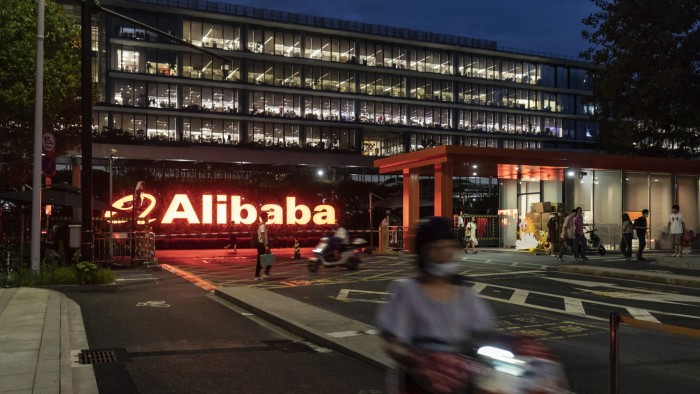Unlock the Editor’s Digest for free
Roula Khalaf, Editor of the FT, selects her favourite stories in this weekly newsletter.
Alibaba’s Hong Kong-listed shares jumped 11.6 per cent on Friday after the Chinese ecommerce giant said it would invest “aggressively” in artificial intelligence over the next three years.
Chief executive Eddie Wu said on Thursday in a call with analysts that the tech group would spend more on cloud and AI infrastructure in the next three years than it had spent over the past decade. He declined to provide details on how much it planned to invest.
Alibaba’s overall capital expenditure in 2024 was Rmb72.5bn ($10bn), up from Rmb24bn in the previous year, as it significantly increased spending on buying processors and infrastructure related to powering the training of large language models.
Wu said the company’s “primary objective” was “pursuing” artificial general intelligence, or AI that is capable of human-level critical thinking. Alibaba said it would soon be launching a deep reasoning model as it seeks to compete with DeepSeek and OpenAI’s recent models that have reasoning capabilities for solving complex tasks.
Alibaba’s planned surge in AI spending comes as the group reported an 8 per cent rise in revenues to Rmb280bn in the final quarter of 2024, its fastest revenue growth in over a year.
The group was boosted by sales from its cloud business, which rose 13 per cent to Rmb31.7bn. Alibaba’s shares were up more than 9 per cent in US morning trading.
Alibaba’s share price has soared by more than 50 per cent since the start of the year, as it has reaped the benefit of a DeepSeek-led AI rally in Chinese tech groups as well as its tie-up with Apple to roll out AI features for iPhones in China.
The group has also been boosted by the comeback of its co-founder Jack Ma. On Monday, Ma was included in a high-profile meeting of top Chinese entrepreneurs with China’s leader Xi Jinping.
His invitation was seen as a clear signal that China’s most famous entrepreneur had been rehabilitated after becoming the most prominent victim of the government crackdown on the tech sector in 2020.
Sales from Alibaba’s international ecommerce business climbed 32 per cent to Rmb37.8bn, driven by the growth of its Temu-like AliExpress platform.
The group’s China commerce business grew 5 per cent to Rmb136bn in the fourth quarter, driven by charges to merchants on its flagship Taobao and Tmall platforms.
Li Chengdong, founder of ecommerce think-tank Haitun, said: “Alibaba’s domestic ecommerce business sales have stopped declining. It has succeeded in its initial goal of stabilising the business”.
Alibaba has been investing heavily in Chinese AI start-ups, including Moonshot and 01.ai, to tap into their expertise to gain a technical edge over rivals, such as Baidu and ByteDance.
Over the past 18 months, Alibaba has open-sourced various large language models in an attempt to consolidate its cloud position by attracting developers to its platform.
But the group faces competition in capturing rising demand from AI, such as Chinese tech champion Huawei.
Charlie Dai, principal analyst at Forrester, said that “in the long run, tech leaders with strong research and development resources”, including Alibaba, Baidu, Tencent and Huawei “will all benefit from the expanding market adoption of AI.”
Read the full article here




